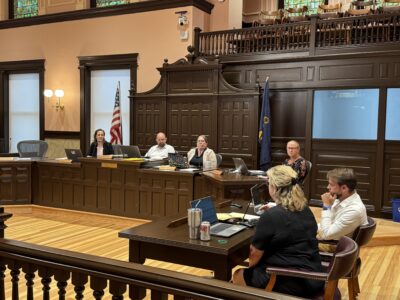Douglas County leaders hear funding requests for child care assistance, youth job training and other anti-poverty initiatives

photo by: Josie Heimsoth/Journal-World
Douglas County commissioners met for their fourth day of budget hearings on Thursday, July 10, 2025.
Youth job training, a child care assistance fund and money that would keep a housing project for chronically homeless residents afloat: These were among the poverty-related initiatives that Douglas County commissioners reviewed funding requests for at their 2026 budget hearings on Thursday.
Thursday was the County Commission’s fourth day of budget hearings, and one of the organizations commissioners heard from was the county’s housing and human services department, which had three separate funding requests totaling $724,304.
Two of the funding requests directly relate to goals established in the five-year Community Health Improvement Plan, or CHIP, which is a strategic plan for health and well-being for Douglas County. The requests aim to create more equitable conditions for people close to the poverty line, as outlined in the anti-poverty goals in the CHIP.
One request, for $62,500, is to fund pre-apprenticeship programming at the Dwayne Peaslee Technical Training Center for 25 Douglas County high school students. One of the CHIP’s anti-poverty goals is to increase the number of students in career and technical education from 150 to 400 by 2029, and the request said the pre-apprenticeship programs would help get the county closer to that goal and would open new postsecondary education and employment pathways for students.
“By equipping students with hands-on experience and practical skills, this program can play a vital role in addressing poverty in Douglas County and building a stronger, more resilient community,” Kevin Kelley, CEO of Peaslee Tech, said in a statement within the budget request.
The other request related to the CHIP goals, this one for $100,000, would be a one-time contribution to a communitywide child care scholarship fund. The fund would provide financial assistance to help low- or moderate-income families with children under 6 years of age and parents in the labor force afford child care.
The third supplemental request from the housing and human services department is for $561,804 to help a supportive housing project for chronically homeless individuals stay afloat.
The project provides housing for 12 chronically homeless people with serious and persistent mental illness and has been funded through a grant from the U.S. Department of Housing and Urban Development. But, as the Journal-World reported, the federal budget reconciliation measure recently passed by Congress and signed by President Donald Trump, sometimes called the “One Big Beautiful Bill,” could threaten the project’s HUD funding, and the people the project houses would be homeless again if that happened.
Assistant County Administrator Jill Jolicoeur said that HUD reached out to the county on Wednesday and confirmed that funding would be available for the program through the end of 2025, but that it would be $187,600 less than the originally approved amount. Looking to next year, Jolicoeur said she wanted to ensure the program remained financially sustainable.
County Administrator Sarah Plinsky said that, in terms of projects that utilize federal funding, it is this specific grant for the supportive housing project that is in jeopardy because the federal grant is expected to completely disappear in 2026.
“We don’t get as much federal grant awards as, say, a city does,” Plinsky said. “… This is pretty much our major area of concern related to grants that specifically come to Douglas County that would be at risk.”
Some of the other organizations with additional funding requests to county commissioners include:
• The Sexual Trauma & Abuse Care Center, which is requesting $300,000 after the organization faced a six-month gap without executive leadership in 2024 that disrupted fundraising and depleted its unrestricted funds. The funding would help stabilize its services for survivors of sexual trauma, maintain essential staff and support the development of a more sustainable fundraising strategy amid ongoing cuts to federal and local funding sources.
“STACC’s financial picture is not simply a reflection of poor planning, it is a direct result of rising operating costs, flat funding levels and the increasing need for services,” the budget request said. “To continue providing free, trauma-informed counseling, 24/7 crisis response, prevention education and systems advocacy, STACC must immediately close a funding gap of $300,000.”
• The food bank Just Food is seeking an additional $50,000 to support long-term sustainability amid rising demand and a sharp drop in federal food supplies. Its partner, Harvesters, was informed earlier this year that 40,000 cases of food from The Emergency Food Assistance Program, or TEFAP — meat, dairy, eggs and dried fruit — scheduled for April to August of this year had been canceled, cutting Just Food’s TEFAP shipments by 30%.
In addition, with the passage of the budget reconciliation measure, the organization anticipates significant cuts to the Supplemental Nutrition Assistance Program, or SNAP, a vital resource for low-income households. In 2025, Just Food has averaged about an additional 100 families per month looking for food assistance.
“I think (the request is) to prep us for where we’re headed,” Aundrea Walker, executive director of Just Food, said. “… With the Big Beautiful Bill passing, I think it’s going to be extremely detrimental. Just two weeks ago, we had 242 households we served in the first three hours. We’re just bursting at the seams and we’re not able to keep food on the shelves.”
• Douglas County’s IT department has three requests totaling $259,413 for three new positions: a part-time IT specialist to manage software, hardware and maintenance contracts; a full-time IT analyst to support services and oversee phones and printers; and a full-time PC specialist to manage printers, phones and maintenance.
The Sheriff’s Office is also requesting additional IT positions and has been for several years. Commissioner Karen Willey noted that both the county’s IT department and the Sheriff’s Office have submitted funding requests and said the commission needs to consider how to prioritize them.
• Douglas County Zoning and Codes, which is seeking $75,000 to perform a diagnostic review of zoning and land use regulations and make sure they align with the community’s Plan 2040 strategic plan. The review will help applicants better understand development expectations, reduce inconsistencies between zoning and other codes and ensure regulations are aligned with state and federal laws. It will also assess the connection between zoning and infrastructure capacity to support more predictable and resilient development.
What’s next?
Douglas County staff is proposing a $191.4 million budget for 2026 that holds the property tax rate flat at 41.298 mills; one mill is one dollar per $1,000 of a property’s assessed value. A homeowner with a $600,000 property would pay $2,850 in property taxes to the county under the proposed rate. A $300,000 home would have a bill of $1,425, and a $200,000 home would incur $950 in taxes.
The tax a property owner pays is determined by both the mill levy and the property’s assessed value, so even if tax rates stay steady or are lowered, rising property values might still cause tax bills to go up for many residents. The total assessed property valuation in Douglas County increased 5.7% in 2025, compared to 6.8% in the previous year.
County commissioners have extended their budget hearings this week to add another day on Friday, July 11, from 9 a.m. to noon. On Friday, commissioners will continue discussions about funding requests from the Bert Nash Community Mental Health Center, Lawrence-Douglas County Fire Medical, HeadQuarters Kansas and the Center for Supportive Communities, among others. They will also explore which funding requests could utilize funding from the behavioral health sales tax.
The public is welcome to attend in person or join virtually via Zoom; however, there will be no opportunity for public comments during the hearings. The details from the meeting and recordings will be available on the county website, and budget deliberations are scheduled to start on Monday, July 14, at 9 a.m.
Additional hearings will also take place for the five-year Capital Improvement Plan and Douglas County Consolidated Fire District #1, scheduled for 4 p.m. on Wednesday, Aug. 6.
The County Commission is currently scheduled to adopt the 2026 budget during a public hearing at its business meeting on Wednesday, Aug. 27. People interested can read the full proposed budget for 2026 on Douglas County’s Budget and Finance webpage.







